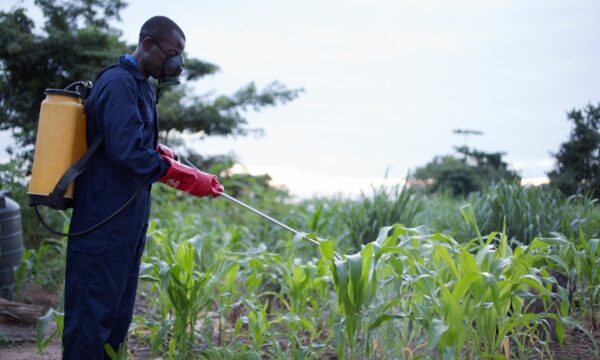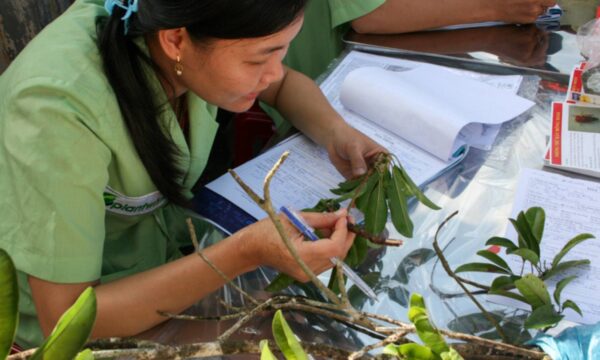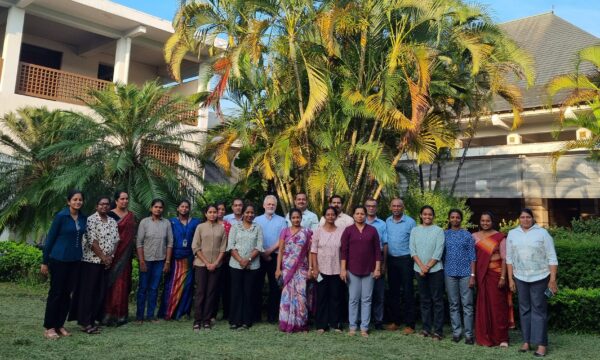To mark World Food Safety Day on 7 June, with the theme of the year “Food safety: prepare for the unexpected“ we take a look at the ways in which the PlantwisePlus pesticide risk reduction pathway can contribute to safer food production.

In many parts of the world, food safety is not guaranteed. Consumers cannot be sure that the food they buy and consume is free from chemicals and diseases that could cause them harm. WHO estimates that 600 million people worldwide fall ill after eating contaminated food. This is almost 1 in 10 people globally. Around 420,000 people die from food poisoning every year.
One of the causes of unsafe food is pesticide residues. Chemical fungicides, herbicides and insecticides are important for food production. However, they can also be harmful to the environment and to humans. Across the world, millions of farmers rely on chemical products to control pests. However, excessive or incorrect use of synthetic pesticides can have a negative impact on food safety.
PlantwisePlus and pesticide risk reduction
PlantwisePlus recognizes the urgent need to address the impact of pesticides on safer food production. The programme helps farmers to apply sustainable approaches to crop production, leading to safer and higher-quality food in domestic markets. The programme also aims to increase farmers’ uptake of lower-risk plant protection products. To this end, it has formulated a pesticide risk reduction pathway.
The pesticide risk reduction pathway is focused on raising awareness of, access to and use of affordable integrated pest management (IPM) solutions. The FAO describes IPM as the careful consideration of all available pest control techniques and subsequent integration of appropriate measures that discourage the development of pest populations.
By working closely with national and local government entities, commercial enterprises and farmers, PlantwisePlus identifies opportunities to reduce pesticide-related risks. This includes identifying and implementing classical biocontrol methods and harnessing the potential of augmentative biocontrol and biopesticide solutions to reduce the impact of priority pests.

Three steps to pesticide risk reduction
Due to increasing plant health threats, more pesticides are used every year around the world. PlantwisePlus recognizes the urgent need to increase the uptake of lower-risk plant protection products by farmers. It does this in three ways:
Firstly, by raising awareness of pesticide risk. PlantwisePlus helps plant health stakeholders learn about pesticide risk and identify lower-risk plant protection products. It does this by using policy streaming and awareness raising.
Secondly, safe and sustainable crop protection. The programme helps smallholder farmers access and apply safer crop production practices. These include, for example, biological control and biopesticides.
Thirdly, increased uptake of integrated pest management solutions. PlantwisePlus provides stakeholders throughout the farming community with support. This means they have a better understanding of IPM practices and are empowered to promote safer alternatives.
Working with governments on maximum residue levels
Many economies across the world face challenges in relation to international food safety standards. For those wanting to trade, horticultural produce must not exceed trading partners’ pesticide maximum residue limits (MRLs) in order to be considered safe. However, farmers in low- and middle-income countries can struggle to comply with these food safety standards. Subsequently, their country’s ability to trade is affected. Even where strong systems are in place to ensure MRL compliance for international markets, similar controls may be lacking for domestic markets.
PlantwisePlus in Kenya
In Kenya, the regulation of importation and exportation, manufacture, distribution and use of pest control products is the responsibility the Pest Control Products Board (PCPB). The Kenya Plant Health Inspectorate Service (KEPHIS) is responsible for assuring plant health, quality of agricultural inputs and produce for food security, globally competitive agriculture and sustainable development. PlantwisePlus works closely with PCPB and KEPHIS on the country’s pesticide risk reduction pathway.
Regular monitoring of pesticide residues in food can help to detect and respond to issues as they arise. A strategic need has been identified for the development of a formal, coordinated pesticide residue monitoring framework. This will support evidence-based food safety risk management of pesticide residues in Kenya. To that end, CABI, along with Ag Aligned and the USDA, is supporting PCPB, KEPHIS and other partners in Kenya in the development of a national pesticide residue monitoring framework through a series of virtual and in-person meetings.
The importance of sharing knowledge on pesticide risk reduction
A pathway for pesticide risk reduction is important on many levels. But ultimately, it is about helping farmers to reduce pesticide risks – whether those risks are to farmers, communities, consumers or the environment – by reducing reliance on pesticides, helping them to choose the right ones and to use them safely. And when non-chemical alternatives can be used, it is also about helping farmers to choose the right approaches and products such as biopesticides.
Food safety is one aspect of food production that benefits from nature-based approaches. The PlantwisePlus pesticide risk reduction can help to ensure compliance with trading partner MRLs, such as those set by the EU. It can also help to safeguard food safety in domestic markets, promote access to and uptake of products and practices that are lower risk to farmers, their communities and the environment.
It is also important to remember that these approaches help to maintain healthier eco-systems and landscapes. And they help to protect the farmers and spray service providers themselves from exposure to chemicals during pesticide application.

Finding solutions to help prevent unauthorized use of pesticides
Finding low risk pest management options for farmers is important. If they cannot find legal or safe alternatives, they sometimes trade on the black market or use products off-label, practices which increase risks. This has implications for food safety. Off-label use and use of illegal pesticides can lead to unsafe levels of pesticide residues.
Farmer livelihoods depend on managing pests, so in one way or another, they will find ways to access products that can do that, even if they are illegal. Knowledge sharing can help stakeholders understand how to manage both pests and pesticide risks. This includes communicating about banned products and the timelines of product phase outs. It also includes communicating with farmers and the people who support them, like agro-dealers and extensionists, to help them find legal and safe alternatives.
The PlantwisePlus Toolkit – helping farmers to reduce pesticide risks
Practical tools can be highly beneficial for helping farmers find the right pesticides, including non-chemical alternatives. An important part of PlantwisePlus is its Toolkit. This resource encompasses many different tools that can help to reduce the use of pesticides. It also helps to increase the use of biocontrol and biopesticides.
Part of the toolkit is the CABI BioProtection Portal. This is the world’s largest free global bioprotection resource. It provides users with registered biocontrol and biopesticide products in their country. It also includes information about how to use these chemical and non-chemical products correctly and judiciously. Other tools include the Crop Sprayer App and the PlantwisePlus Knowledge Bank. The Toolkit also includes digital learning courses from the CABI Academy, including the Crop Pest Diagnosis Course and the Crop Pest Management Course.
There are many aspects to consider when it comes to food safety. Pesticide risk reduction is one of those factors. While pesticides perform an important function, they can be dangerous to human health. However, the correct and judicious use of pesticides can reduce those risks. And the introduction of non-chemical alternatives to pesticides is a sustainable approach to global food safety.
PlantwisePlus
PlantwisePlus gratefully acknowledges the financial support of the Directorate-General for International Cooperation (DGIS), Netherlands; European Commission Directorate General for International Partnerships (INTPA, EU); the Foreign, Commonwealth & Development Office (FCDO), United Kingdom; and the Swiss Agency for Development and Cooperation (SDC)
Related News & Blogs
How do pest risk registers address the spread of plant pests in Africa?
Pest risk registers can help to solve problems in agriculture, addressing the growing global threat of plant pests. Moreover, changing weather patterns, led by rising temperatures, are causing them to reproduce faster and expand into new regions. In ad…
10 July 2025




